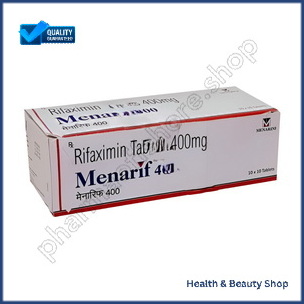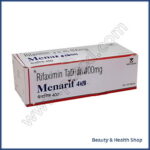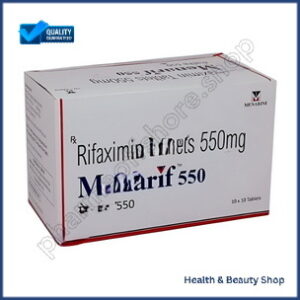ADDICTION
ALCOHOL DEPENDENCE
QUIT SMOKING
ALLERGY
ANTI FUNGAL
FUNGAL INFECTION
FUNGAL NAIL INFECTIONS
ANTI-REJECTION DRUGS
ANTI WORM
ANTIBIOTIC
BACTERIAL INFECTIONS
ARTHRITIS
GOUT
OSTEOARTHRITIS
RHEUMATOID ARTHRITIS
BLOOD
LOW PLATELET COUNT
THROMBOPHLEBITIS
VARICOSE VEINS
COLON
ANAL FISSURE
PILES
ULCERATIVE COLITIS
DIABETES CARE
DIABETES INSIPIDUS
DIABETES TYPE
DIABETIC FOOT ULCERS
GLUCOSE MONITOR
EYES/EAR CARE
DRY EYES
EYE CARE
EYE EXAMINATION
EYE INFECTION
EYE LASHES
EYE PAIN
GLAUCOMA
OCULAR HYPERTENSION
UVEITIS
FEVER CARE
MALARIA
RHEUMATIC FEVER
TYPHOID FEVER
GASTROINTESTINAL
ACIDITY
CONSTIPATION
CROHN'S DISEASE
DIARRHOEA
GALLBLADDER STONES
INTESTINAL ULCERS
IRRITABLE BOWEL SYNDROME
MOTION SICKNESS
NAUSEA
Menarif 400 mg (Rifaximin)
| Active Ingredient (Generic Name): | Rifaximin |
|---|---|
| Indication: | Irritable bowel syndrome, Hepatic encephalopathy |
| Manufacturer: | Menarini India Pvt Ltd |
| Packaging: | 10 tablets in one strip |
| Strength: | 400 mg |
From: $34.00
Menarif 400 mg (Rifaximin) is a prescribed antibiotic for specific bacterial infections in the intestines like travelers’ diarrhea caused by E. coli and hepatic encephalopathy recurrence. Take one tablet orally three times daily, completing the full treatment as directed. It inhibits bacteria growth and reduces gastrointestinal symptoms. Follow dosing instructions accurately, swallow the tablets whole, and avoid grapefruit products. Be mindful of severe side effects like allergic reactions or liver problems. Inquire about drug interactions, storage, and disposal guidelines. Menarif is available under various brand names globally. Ensure proper usage and consult healthcare providers for guidance on its purchase.
Start taking Menarif 400 mg (Rifaximin) as directed by your healthcare provider to effectively manage your condition. This medication is typically prescribed to treat certain bacterial infections in the intestines. Rifaximin works by stopping the growth of bacteria, helping to alleviate symptoms such as diarrhea, bloating, and stomach cramps. It is important to follow your healthcare provider’s instructions carefully when taking Menarif 400 mg to guarantee its effectiveness.
Make sure to take Menarif 400 mg exactly as prescribed, typically one tablet orally three times a day. It is essential to complete the full course of treatment even if you start feeling better. Missing doses or stopping the medication prematurely could lead to the bacteria becoming resistant and the infection returning.
Inform your healthcare provider about any other medications you are taking, as they may interact with Rifaximin. Additionally, discuss any medical conditions you have, especially liver problems, to ensure the safe use of Menarif 400 mg. If you experience severe side effects or your symptoms worsen, seek medical attention promptly.
Why is this medication prescribed?
To understand why Menarif 400 mg (Rifaximin) is prescribed, it’s important to recognize the specific bacterial infections in the intestines that this medication targets for treatment. Rifaximin is primarily prescribed to treat travelers’ diarrhea caused by E. coli bacteria. It is also used for the reduction of hepatic encephalopathy recurrence in adults. By targeting certain types of bacteria in the gut, Rifaximin helps alleviate symptoms such as diarrhea, abdominal pain, and discomfort associated with these infections. Additionally, this medication may be prescribed for irritable bowel syndrome with diarrhea (IBS-D) in adults. The active ingredient in Menarif 400 mg works by inhibiting the growth of bacteria in the intestines, thereby reducing the severity and duration of symptoms related to bacterial infections. It is essential to follow your healthcare provider’s instructions precisely when taking Rifaximin to guarantee its effectiveness in treating the specific gastrointestinal conditions it is prescribed for.
How should this medicine be used?
When using Menarif 400 mg (Rifaximin), make sure to follow the prescribed dosage and administration instructions provided by your healthcare provider to effectively treat the targeted bacterial infections in the intestines. Typically, this medication is taken orally, with or without food, usually three times a day as directed by your doctor. It is crucial to complete the full course of treatment, even if you start feeling better, to guarantee the infection is completely eradicated. Swallow the tablets whole with a glass of water; do not crush or chew them. If you happen to miss a dose, take it as soon as you remember. However, if it is almost time for your next dose, skip the missed dose and continue with your regular dosing schedule. Do not take a double dose to make up for a missed one. If you have any questions or concerns about the usage of Menarif 400 mg, do not hesitate to consult your healthcare provider for clarification.
Other uses for this medicine
Consider discussing with your healthcare provider the potential alternative uses of Menarif 400 mg (Rifaximin) beyond treating bacterial infections in the intestines. While this medication is primarily prescribed for conditions like traveler’s diarrhea and irritable bowel syndrome with diarrhea, there is ongoing research into its efficacy for other gastrointestinal disorders. Some studies suggest that Rifaximin may have a role in managing hepatic encephalopathy, a complication of liver cirrhosis. Additionally, it is being investigated for its potential benefits in small intestinal bacterial overgrowth. However, it is essential to note that the effectiveness of Menarif 400 mg for these conditions may vary, and it should only be used for alternative indications under the guidance of a healthcare professional. Always follow your doctor’s instructions carefully and seek their advice before considering the use of Menarif 400 mg for any condition other than what it has been prescribed for.
What special precautions should I follow?
When taking Menarif 400 mg (Rifaximin), it is important to check for any possible drug interactions. This step helps guarantee the medication’s effectiveness and your safety. Always consult with your healthcare provider or pharmacist to avoid any complications.
Check for Drug Interactions
Regularly check for potential drug interactions with Menarif 400 mg (Rifaximin) to guarantee safe and effective treatment. When taking Menarif 400 mg, consider the following precautions to prevent adverse effects and ensure best therapy:
- Consult with your healthcare provider or pharmacist before starting any new medication, including over-the-counter drugs, herbal supplements, or vitamins.
- Inform your healthcare provider about all the medications you are currently taking to assess potential interactions with Menarif 400 mg.
- Be cautious when combining Menarif 400 mg with drugs that affect liver enzymes, such as certain antibiotics or antifungals, to avoid altering Rifaximin levels in the body.
What special dietary instructions should I follow?
To optimize the effectiveness of Menarif 400 mg (Rifaximin), it is important to adhere to specific dietary guidelines. While taking this medication, it is advisable to avoid consuming grapefruit or grapefruit juice as they can interact with Rifaximin and affect its absorption in the body. Opt for a balanced diet rich in fruits, vegetables, and whole grains to support the medication’s efficacy.
It is recommended to stay hydrated by drinking an adequate amount of water throughout the day to help facilitate the proper functioning of Menarif 400 mg. Avoid excessive consumption of alcohol, as it can worsen certain side effects of the medication and decrease its effectiveness in treating the intended condition.
Additionally, it is beneficial to limit the intake of high-fat foods while on Menarif 400 mg, as fatty foods can interfere with the absorption of the medication in the digestive system. Following these dietary instructions can help maximize the benefits of Rifaximin and improve your overall treatment outcomes.
What should I do if I forget a dose?
If you overlook a dose of Menarif 400 mg (Rifaximin), take it as soon as you recall unless it is near the time for your next scheduled dose. In that situation, skip the missed dose and continue with your regular dosing schedule. Do not increase the dose to make up for it. It is crucial to maintain a consistent dosing regimen to guarantee the effectiveness of the medication. If you have trouble remembering to take your doses, consider setting a reminder on your phone or using a pill organizer to help you stay on track. If you have any concerns or questions about missed doses or how to take Menarif 400 mg, consult your healthcare provider for guidance. Consistency in taking your medication as prescribed is vital for managing your condition effectively.
What side effects can this medication cause?
Menarif 400 Mg (Rifaximin) can cause various side effects that require monitoring. Some of these side effects can be severe and may necessitate immediate medical attention. If you notice symptoms like persistent adverse effects, it is important to contact your doctor promptly for further evaluation and guidance.
Monitor for Persistent Adverse Effects
Observing for potential adverse effects is crucial when taking Menarif 400 mg (Rifaximin) to ensure your well-being and health are prioritized.
- Common Side Effects: You may experience bloating, gas, or a headache while on this medication.
- Digestive Issues: Inform your healthcare provider if you notice persistent diarrhea or stomach pain.
- Allergic Reactions: Watch for signs like rash, itching, swelling, dizziness, or difficulty breathing, and seek immediate medical attention if you encounter any of these symptoms.
Some side effects can be serious. If you experience any of the following symptoms, call your doctor immediately:
Your health should always be a top priority, particularly when taking Menarif 400 mg (Rifaximin), as certain side effects can be severe and require immediate medical attention.
- Severe Allergic Reactions: Symptoms like rash, itching/swelling (especially of the face/tongue/throat), severe dizziness, and difficulty breathing may indicate a serious allergic reaction.
- Persistent Diarrhea: If you experience prolonged or bloody diarrhea during or after treatment, it could be a sign of a serious condition that requires medical evaluation.
- Liver Problems: Watch out for symptoms such as persistent nausea/vomiting, stomach/abdominal pain, yellowing eyes/skin, dark urine, or unusual tiredness, as these could indicate liver issues that need prompt medical attention.
What should I know about the storage and disposal of this medication?
For proper storage and disposal of this medication, it is essential to follow specific guidelines to ensure its effectiveness and safety. Menarif 400 mg (Rifaximin) should be stored at room temperature between 68-77 degrees Fahrenheit (20-25 degrees Celsius) in a tightly closed container, away from moisture and heat. Keep it out of reach of children and pets. Avoid storing it in the bathroom. Check the expiration date before use and discard any expired medication.
When it comes to disposing of Menarif 400 mg, do not pour it down the drain unless instructed to do so. Properly discard this medication by following local regulations or guidelines. You can consult your pharmacist or local waste disposal company for more information on how to safely dispose of it. If you have any doubts about the storage or disposal of this medication, seek guidance from your healthcare provider. Proper storage and disposal practices not only maintain the medication’s potency but also prevent any potential harm to others and the environment.
In case of an emergency/overdose
If an overdose or emergency situation occurs with Menarif 400 mg (Rifaximin), immediately contact poison control or seek medical assistance. Overdosing on Menarif 400 mg can lead to symptoms such as severe stomach pain, nausea, vomiting, and diarrhea. In case of an overdose, it is important to act promptly to prevent any potential complications. When seeking medical help, be prepared to provide information about the amount of medication taken and the time of ingestion.
If you or someone else experiences severe symptoms after taking Menarif 400 mg, do not hesitate to call emergency services for immediate assistance. It is important to remember that overdosing on any medication can be risky and should be treated as a medical emergency. Follow the instructions given by healthcare professionals or emergency responders carefully.
In the event of an overdose, do not attempt to induce vomiting unless instructed to do so by medical personnel. Stay calm, provide accurate information about the situation, and cooperate with healthcare providers to ensure the best possible outcome.
What other information should I know?
In addition to being aware of the risks of overdose, it is important to understand other essential information about Menarif 400 mg (Rifaximin). Menarif is an antibiotic used to treat bacterial infections in the intestines. It works by stopping the growth of bacteria that can cause these infections. This medication should be taken exactly as prescribed by your healthcare provider, even if you start feeling better before you finish the entire course. Skipping doses or stopping the medication early may lead to the infection not being fully treated.
It is vital to inform your doctor about any other medications you are taking, including prescription, over-the-counter, and herbal supplements, as they may interact with Menarif. Additionally, let your healthcare provider know if you have any allergies, especially to rifaximin or other antibiotics. Menarif may cause side effects such as bloating, gas, or stomach pain. If you experience severe side effects like persistent diarrhea or blood in the stool, contact your doctor immediately.
Brand names
Menarif 400 mg (Rifaximin) is marketed under various brand names around the world. This medication is sold under different names depending on the country or region. Below is a table listing some of the brand names for Menarif 400 mg (Rifaximin) in different parts of the world:
| Brand Name | Country/Region | Manufacturer |
|---|---|---|
| Rifagut | India | Sun Pharmaceutical |
| Xifaxan | United States | Salix Pharmaceuticals |
| Normix | Europe | Alfa Wassermann |
| Zix | China | Beijing Union Pharmaceutical |
These are just a few examples of the brand names under which Menarif 400 mg (Rifaximin) is available globally. It is important to consult a healthcare professional to make sure you are taking the correct medication, regardless of the brand name it is sold under in your area.
Purchase Options for Menarif
Considering different options for purchasing Menarif 400 mg (Rifaximin) can help you find the best deal for your needs. When looking to purchase Menarif, there are several avenues to explore. You can start by checking with local pharmacies in your area. Many pharmacies carry Menarif and may offer competitive pricing. Another option is to look into online pharmacies. Online platforms often provide convenience and sometimes offer discounts or promotions that can make Menarif more affordable. It’s crucial to verify that the online pharmacy is reputable and licensed to avoid any potential risks. Additionally, some healthcare providers may have partnerships with specific pharmacies, which could result in discounted prices for Menarif. Before making a purchase, compare prices from different sources to find the most cost-effective option that suits your budget and needs. By exploring these various purchase options, you can make an informed decision when acquiring Menarif 400 mg.
To summarise
Exploring different avenues for purchasing Menarif 400 mg can help you find the most cost-effective option that meets your budget and needs. When summarizing the information presented regarding Menarif 400 mg, it is vital to take into account the various purchase options available. Online pharmacies offer convenience and competitive pricing, but make sure they are reputable and licensed to guarantee the authenticity of the medication. Local pharmacies provide immediate access and personalized assistance, although prices may vary. Consulting with your healthcare provider for guidance on purchasing Menarif 400 mg is essential to ensure proper dosage and usage. Additionally, exploring patient assistance programs or manufacturer discounts can help alleviate the financial burden associated with this medication. Remember to compare prices, quality, and service when deciding where to purchase Menarif 400 mg to make an informed choice that suits your requirements. By evaluating these factors, you can secure Menarif 400 mg in a cost-effective manner that aligns with your healthcare needs.
Based on 0 reviews
Only logged in customers who have purchased this product may leave a review.









There are no reviews yet.